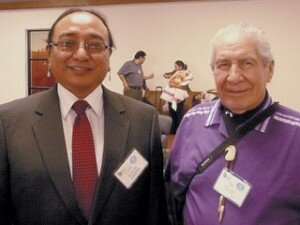US human rights record challenged
American Indians, Featured — By Valerie Taliman on March 22, 2010 at 06:59
Navajo Nation Council Delegate Rex Lee Jim and Onondaga Nation Faithkeeper Oren Lyons were among those who documented the ongoing violations against indigenous peoples as the United Nations reviews the United States’ compliance with human rights obligations. Photo by Valerie Taliman
ALBUQUERQUE, N.M. – Where do Indian nations go when United States’ courts have failed them, and justice is unattainable?
The Haudenosaunee Confederacy – the oldest continuous democratic government in North America – has long argued that Indian nations should not expect to win justice from colonizing governments, and instead must act as sovereign nations taking their quest for justice to the United Nations and its human rights mechanisms.
Though it claims to be a defender of human rights around the world, the United States is among the worst offenders of Native peoples’ rights, judging by statistics that indicate Indian women are the most raped and abused in the nation, while rampant poverty, disease, crime and unemployment are a way of life on reservations.
There’s also the inexplicably high number of Supreme Court cases decided against tribes that have led to the massive loss of Native lands and natural resources, most often without compensation.
That negative image was bolstered during the Bush regime when the U.S. was voted off the U.N. Human Rights Council, and later was one of only four countries to oppose the adoption of the U.N. Declaration on the Rights of Indigenous Peoples.
The Declaration was adopted in September 2007 with 144 states in favor, 11 abstentions, and only four votes against – by the United States, Canada, Australia and New Zealand – countries with the largest indigenous populations who own vast amounts of land and natural resources.
Since its adoption, Australia has reversed its position and endorsed the Declaration, while Canada, Colombia and Samoa have recently indicated support.
That leaves the United States and New Zealand standing alone, refusing to support the basic human rights of the world’s 370 million indigenous peoples.
Many hope this will change under President Barack Obama, an adopted son of the Crow Nation of Montana, who has appointed more Native Americans to his administration than any president in history.
Since his election, the United States has regained a seat on the U.N. Human Rights Council, and the president has made positive statements to Indian nations about settling longstanding claims.
Review of human rights record
Against that backdrop, the Human Rights Council is conducting a year-long Universal Period Review of the United States’ human rights record, holding “listening sessions” around the country, with two devoted to concerns of Native peoples.
A national report will be compiled and presented to the 47-member Human Rights Council that will make recommendations on how America can improve its compliance with international human rights obligations.
More than 100 people came to the University of New Mexico Law School to hear and present testimony from tribes and individuals about discriminatory and illegal tactics historically used by the federal government to confiscate land, natural resources, even children, and to suppress their rights to self-determination.
Among them were at least nine top-level officials from the Obama administration who were sent from the departments of Justice, Housing, Health, Education and Agriculture to listen and help formulate solutions for Indian country.
Doctrine of Discovery denounced
Oren Lyons, a faithkeeper from the Onondaga Nation and the Six Nations’ Council of Chiefs, spoke on a panel of leaders about the right to self-determination and the need to honor treaties made by Indian nations with the United States.
“We remind the USA that the Haudenosaunee hold some of the earliest treaties made by your government with European settlers. The Department of Justice last month re-affirmed the continued validity of the 1794 Treaty of Canandaigua in an amicus brief it filed in support of the Cayuga Nation. We have faithfully complied with our treaties; unfortunately the same cannot be said of the USA.”
He traced the roots of 220 years of discriminatory policies designed to remove Native peoples from their homelands, decimate their populations, forcibly take children to boarding schools to be cleansed of their language and culture, and generally perpetrate cultural genocide.
Lyons also denounced discriminatory legal doctrines that underlie United States law. “Among the most damaging of these is the Doctrine of Christian Discovery which claims that Europeans acquired rights over lands used and occupied by indigenous peoples, simply because they were Christians. They deemed Native peoples as heathens, savages and pagans with no right to own land.”
Lyons cited a new study by Tonya Gonnella Frichner, Special Rapporteur for North America to the U.N. Permanent Forum on Indigenous Issues, which examines the impacts of the Doctrine of Discovery as a foundation for the violation of human rights.
He called on the United States to endorse the U.N. Declaration on the Rights of Indigenous Peoples, to ensure that all pending federal legislation (including climate change) contains protections for indigenous human rights, and to honor the border crossing and passport rights of the Six Nations Confederacy which straddles the international border imposed by the U.S. and Canada.
The Black Hills
Chairwoman Theresa Two Bulls of the Oglala Sioux, accompanied by Lakota attorney Mario Gonzalez, recounted the many treaty violations that led up to the “legalized theft” of more than 48 million acres of their homeland under the Indian Claims Commission.
She cited one example of how the federal government would not allow the tribes to fire their attorneys and – without the knowledge or consent of Sioux tribes – the claims attorneys signed a stipulated settlement to accept $40 million for more than 48 million acres of land rich in timber and minerals.
The Lakota leadership of treaty chiefs and elected officials have long refused to accept money for the Black Hills, a sacred place, and were appalled when a class action suit, Different Horse v. Salazar, was filed last year to force the Interior Department to distribute money for Docket 74-A and 74-B Sioux land claims as per capita payments to tribal members.
With interest, that amount exceeds more than $1 billion. But if the money is distributed, Sioux tribes fear the U.S. will argue that they have relinquished their claims to the land.
“We’ve come to the realization that the courts of the United States are not designed to protect the Oglala Sioux’s interests in our claims to ancestral lands and resources. Rather, they are designed to protect the interests of non-Indians who have settled on tribal lands,” Two Bulls said. “The only viable remedy we have to settle our land claims is through negotiating with Congress.”
She was encouraged by President Barack Obama’s statement regarding the Sioux land claims indicating he did not believe the courts or federal government should force Sioux tribes to take settlement money for the Black Hills.
“He said he was open to bringing together all parties through government-to-government negotiations to explore innovative solutions to this long-standing issue,” she said, giving her people hope that the tribe will be able to obtain the return of federally held lands within their aboriginal territories.
Gonzalez said the Rosebud Sioux Tribe has taken the lead intervening in the lawsuit and requesting a dismissal.
He is encouraging the treaty councils and tribal councils to unite and seek a realistic settlement plan with the Obama administration that would include restoration of federally held lands and compensation for the denial of the “exclusive use and occupation of the Black Hills as guaranteed by the 1868 Treaty of Fort Laramie.
Others testified about environmental racism, infringement on Native spiritual practices, the militarization of the borders, and violence against Native peoples.
The listening session was co-hosted by the American Indian Law Center and the Navajo Nation Human Rights Commission, and coordinated by a committee from the All Indian Pueblo Council, Native American Rights Fund, International Indian Treaty Council, and National Congress of American Indians.
Written submissions up to five pages will be accepted until April 19, 2010 by e-mailing to: UPRsub [email protected].
Part two of this story reports on environmental racism, uranium mining, sacred sites, violations of religious freedom and prisoner’s rights.
Tags: All Indian Pueblo Council, American Indian Law Center, crime, disease, environment, haudenosunee confederacy, Human Rights, International Indian Treaty Council, land rights, Native American Rights Fund, native americans, Navajo Nation Human Rights Commission, Poverty, universal period reviewAuthor: Valerie Taliman (6 Articles)

Valerie Taliman, Navajo, is president of Three Sisters Media, which offers publishing, social media and public relations services. She is also an award-winning journalist specializing in environmental, social justice and human rights issues. She is based in Albuquerque, N.M. Contact her at [email protected].



 Share This
Share This Tweet This
Tweet This Digg This
Digg This Save to delicious
Save to delicious Stumble it
Stumble it





 “Government-run” no longer defines the Indian health system
“Government-run” no longer defines the Indian health system Something precious is missing
Something precious is missing







